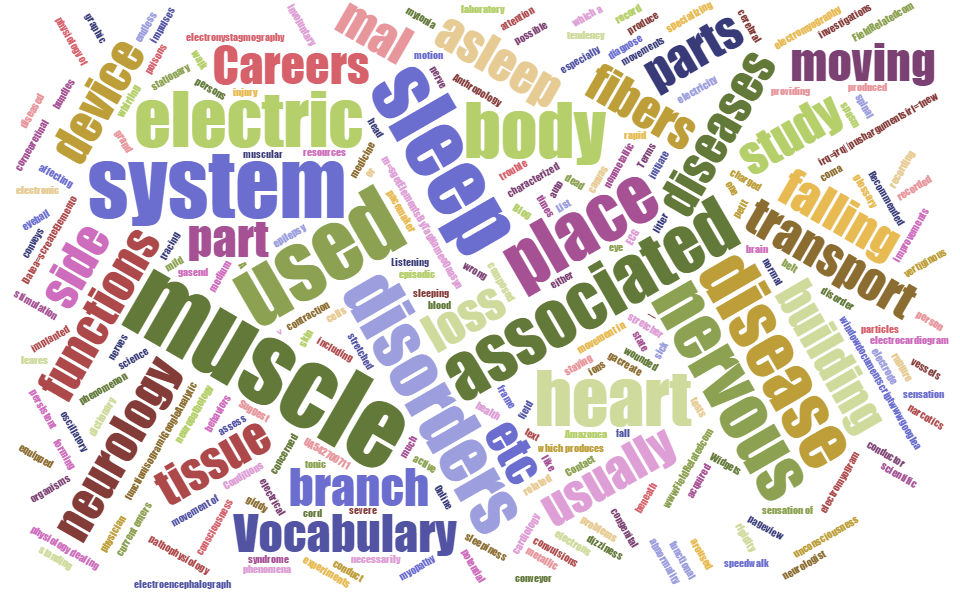Electrophysiology

Reading resources
Online dictionary
Vocabulary List
- electrode
- a conductor, not necessarily metallic, through which a current enters or leaves a nonmetallic medium
- stretcher
- A litter, usually of canvas stretched over a frame, used to transport the sick, wounded, or dead.
- neuropathology
- The branch of medicine concerned with diseases of the nervous system.
- muscle
- a tissue composed of cells or fibers, the contraction of which produces movement in the body.
- sleep disorders
- sleep disorders are problems with sleeping, including trouble falling or staying asleep, falling asleep at the wrong times, too much sleep or abnormal behaviors during sleep.
- cardiology
- the study of the heart and its functions in health and disease
- neurology
- the science of the nerves and the nervous system, especially of the diseases affecting them
- electricity
- any phenomenon associated with stationary or moving electrons, ions, or other charged particles
- pacemaker
- an electronic device implanted beneath the skin for providing a normal heartbeat by electrical stimulation of the heart muscle
- electrocardiogram
- ECG a tracing of the electric currents that initiate the heartbeat, used to diagnose possible heart disorders
- epilepsy
- a disorder of the nervous system, characterized either by mild, episodic loss of attention or sleepiness (petit mal) or by severe convulsions with loss of consciousness (grand mal)
- nystagmus
- a congenital or acquired persistent, rapid, involuntary, and oscillatory movement of the eyeball, usually from side to side
- dizziness
- having a sensation of whirling and a tendency to fall; giddy; vertiginous.
- electromyography
- a device for recording electric currents from an active muscle to produce an electromyogram.
- electronystagmography
- A study of the recorded changes in corneoretinal potential caused by movements of the eye, used to assess nystagmus.
- myopathy
- any abnormality or disease of muscle tissue.
- mytonia
- tonic muscle spasm or muscular rigidity.
- coma
- a state of unconsciousness from which a person cannot be aroused, caused by injury to the head, rupture of cerebral blood vessels, narcotics, poisons, etc
- nerve
- one or more bundles of fibers forming part of a system that conveys impulses of sensation, motion, etc., between the brain or spinal cord and other parts of the body.
- laboratory
- a building, part of a building, or other place equipped to conduct scientific experiments, tests, investigations,
- pathophysiology
- the physiology of abnormal or diseased organisms or their parts; the functional changes associated with a disease or syndrome.
- electrophysiology
- the branch of physiology dealing with the electric phenomena associated with the body and its functions.
- electroencephalography
- a graphic record produced by an electroencephalograph.
- speedwalk
- an endless conveyor belt, moving walk, or the like used to transport standing persons from place to place.
- neurologist
- a physician specializing in neurology.
Recommended









